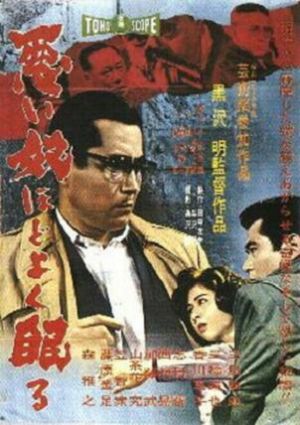
Between the recent Akira Kurosawa month on TCM and the always-changing order of my rental queue, I have seen a lot of Kurosawa’s films. “The Bad Sleep Well” was one of the first. Called “Kurosawa’s unofficial Hamlet“ by critic Ed Park, I found the movie to go far beyond the usual adjectives attached to it: Cynical, realist, obsessive. It is also devastating. This movie ruined my life. It ripped out my heart and flattened it with a heavy heel, grinding it into the concrete and then kicking the pieces apart with its pointed toe.
There are moments in film that are difficult to watch. They hit you just right, they move you to an extreme that’s uncomfortable. In “The Bad Sleep Well”, there is a moment you don’t see. Someone’s death, the death of a man whose life-ruining obsessive hate still wasn’t enough to right the wrongs done; a death not shown save a lingering shot of an empty, ruined, bloody Studebaker. The worst thing I have ever seen on screen is not seeing that death, only seeing it acted out by a man who can never be himself again.
It’s a cliche to say a movie changed your life. Neophytes say that, people whose lives are so devoid of strong feeling that even the slightest stirring of emotion causes them to believe their lives are irrevocably altered. So it’s not easy for me to say, but it’s the truth that “The Bad Sleep Well” changed my life. It dashed the last few futile hopes for humankind I thought I had. I should be upset about that, but I’m not. I’m just stunned. It was a long time coming, although the slow decline of my optimism by inches is what I always imagined, not one swift sword to the neck.
Robert Osborne said in an outro to “High and Low” that Kurosawa always tried to answer one question in his films: Why can’t people be happy? Well, I know why, and despite his protestations, Kurosawa knew, too.

Great write up! – Kurosawa is one of the director’s I admire the utmost. I found this film to be one of his most challenging. If you haven’t already seen them already I’d recommend STRAY DOG (my favourite Kurosawa film) and HIGH AND LOW…good to see the emperor getting some coverage.
That is a pretty powerful reaction to an undeniably great film. Thank you for writing this.
The movie also illustrates something that I find depressing for reasons completely unrelated to yours. Although the Production Code really began to teeter in 1960 (The Apartment, Psycho), it still boggles the mind to realize that if Hollywood had a Kurosawa, he could not make this film that year (I’ll put aside the minor quibble that Hollywood would not have financed any such film in any event, because it would have concluded, unfortunately correctly, that Americans were not ready for such fare). This same feeling occurs to me often, watching foreign films from the Production Code era.
We can all be nostalgic for the great Hollywood films of the mid-30s through the mid-60s, but I have to lament the films left unmade, and the plays and novels that were bowdlerized into pap so they could make it to the screen. When you think about what a film could look like in say 1964, and compare it to just 6 or 7 years later, the change is revolutionary, which may be one reason I love that latter era so much. Yes, you had excesses and stupidity, but that always occurs when something repressed is allowed to be free–it happens among nations (consider Eastern Europe after 1991), subcultures (gay America in 70s), and so on. I would never, ever go back. Freedom is always to be preferred, unconditionally.
Anyway, sorry for the detour, but the first time I saw this film, after the initial cinematic shock, I really was struck by just how much was lost for 30+ years here. People generally like the history of American cinema over those 30 years (understandably–they were weened on it, at least if they are of a certain age), but you really don’t have to exercise too much imagination to envision what could have been.
More Kurosawa, Stacia!
Beautiful piece.
That said, I wish I could give you a hug through the internet.
Watch Red Beard sometime. Preferably soon. And reflect that Kurosawa made it AFTER Bad. Yes, he may have known that we can’t be happy. But he also knew if we didn’t try, well nothing good would come of it.
Lovely. I’ve been trying to see this for awhile, because, y’know, you’re not a Film Buff until you’ve seen three of his major films (two down, okay!?!), you make it sound beautiful.
I put off posting this for a couple of months out of insecurity, so it’s nice to hear positive comments. Thank you all, I mean it.
Shaun, “Stray Dog” is in my to-watch pile, along with about 7 other Kurosawa films. And Bryce, I have not seen “Red Beard” yet, but it’s in the pile as well. (As is “Ikiru,” which I hesitate to see now because… well, you know.)
KG, I had very similar thoughts to Code and censorship issues when I saw “High and Low,” oddly enough. There was some discussion of censorship in Kurosawa’s early “Drunken Angel,” too, and it’s kind of depressing to see how much he got away with even AFTER he was pressured, versus what the US filmmakers were getting away with at the same time.
Simon, this is a great film, but if you become despondent, don’t say I didn’t warn ya!
As far as production codes go in relation to Kurosawa. Remember that US occupying forces put restrictions on Japanese films. Ever wonder why there are no American soldiers on the streets of Tokyo in Stray Dog?
If you want to see the closest thing to the antithesis of The Bad Sleep Well from Kurosawa then see Dodes’Ka-Den.